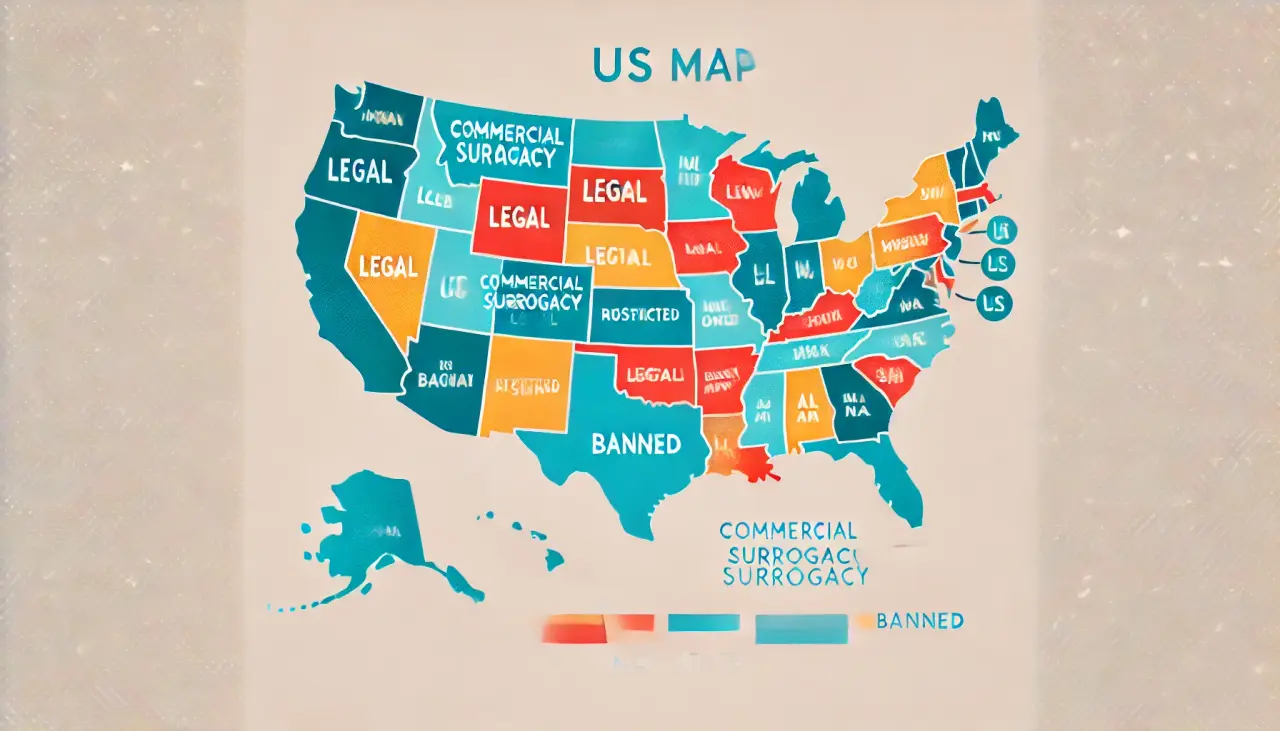
Surrogacy in the US: A Guide to Commercial Surrogacy and State-Specific Laws
Surrogacy has become a well-established practice in the United States, offering couples the opportunity to build families. However, surrogacy laws vary widely across the country, creating a complex legal landscape. This article explores the differences in US surrogacy laws by state and examines the role of commercial surrogacy in the US. Whether you’re a U.S. citizen or an international intended parent, understanding these legal nuances is critical before embarking on your surrogacy journey.

Types of Surrogacy in the US: Gestational vs. Traditional
In the U.S., there are two primary types of surrogacy:
- Gestational Surrogacy: This involves a surrogate who carries an embryo created with another woman’s egg and sperm from either the intended father or a donor. The surrogate has no genetic connection to the child.
- Traditional Surrogacy: Here, the surrogate uses her own egg, making her the biological mother of the child. This method is less common due to the legal complexities and emotional challenges involved.
Commercial Surrogacy in the US: What It Involves
Commercial surrogacy in the US refers to arrangements where the surrogate is compensated beyond medical and pregnancy-related expenses. While controversial in some places due to ethical, cultural, and legal concerns, commercial surrogacy is allowed in several U.S. states. Compensation for surrogates typically ranges from $25,000 to $50,000, on top of other expenses.
Key Aspects of Commercial Surrogacy:
- Surrogates must meet specific criteria, including being between the ages of 21 and 44, having had at least one successful pregnancy, and demonstrating financial stability.
- Commercial surrogacy agreements are legally binding, with both parties required to have legal representation.
Surrogates cannot participate solely for financial gain; they must undergo psychological and medical evaluations to ensure they are physically and emotionally prepared for the journey.

US Surrogacy Laws by State: Where Is Surrogacy Legal?
Surrogacy in the US is not governed by federal law, which means that states have the freedom to create their own regulations. As a result, some states are surrogacy-friendly, while others restrict or outright ban the practice.
Surrogacy-Friendly States:
- California: Known for being a surrogacy hub, California offers comprehensive legal protections for both intended parents and surrogates. It allows commercial surrogacy and is widely regarded as a preferred destination for international surrogacy.
- Idaho: Idaho has lower surrogacy costs and is becoming increasingly popular for commercial surrogacy due to its relatively favorable legal environment.
- New Jersey, Illinois, Maine, Delaware, and Connecticut: These states have clear legal frameworks that support both altruistic and commercial surrogacy arrangements.
States with Restrictions or Bans:
- Michigan: Commercial surrogacy is completely banned in Michigan, with penalties that include up to five years in prison and fines of $50,000.
- Louisiana: Only allows surrogacy for married heterosexual couples using their own sperm and eggs. This excludes single parents and same-sex couples from accessing surrogacy in the state.
- Wyoming: Has no specific surrogacy laws, leaving intended parents and surrogates without clear legal protections.
Understanding the US surrogacy laws by state is essential for both intended parents and surrogates to ensure they operate within legal boundaries and receive the necessary protections.

Surrogacy Costs in the US: What to Expect
The cost of surrogacy in the US varies significantly based on location, legal requirements, and medical fees. On average, the total cost ranges from $120,000 to $200,000. States like Idaho, where surrogacy is more affordable, have seen a surge in surrogacy arrangements, contributing to a local baby boom.
Breakdown of Costs:
- Surrogate Compensation: $25,000–$50,000
- Medical Expenses: Including IVF and pregnancy monitoring
- Legal Fees: Necessary for drafting and reviewing surrogacy agreements
- Miscellaneous Costs: Travel, insurance, and other related expenses
Surrogacy for Non-US Citizens: Can the Child Become a US Citizen?
For international parents, surrogacy in the US offers an added benefit: children born through surrogacy are eligible for U.S. citizenship, regardless of the parents’ nationality. This makes the U.S. a popular destination for foreign couples looking to expand their families.
Key Points:
- Any child born in the U.S. through surrogacy can obtain a U.S. passport.
- Intended parents, whether U.S. citizens or not, can secure legal parentage through pre-birth orders in many states.
However, U.S. citizens seeking surrogacy abroad may face challenges in securing U.S. citizenship for their children, depending on the country’s surrogacy regulations.
Conclusion: Navigating Surrogacy in the US
Understanding the varying legal landscapes and financial aspects of surrogacy in the US is crucial for both intended parents and surrogates. Whether you’re navigating commercial surrogacy in the US or considering state-specific laws, working with experienced legal and medical professionals ensures a smoother journey. Always consult with local experts to ensure compliance with the US surrogacy laws by state and make informed decisions about building your family through surrogacy.